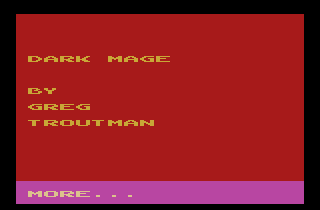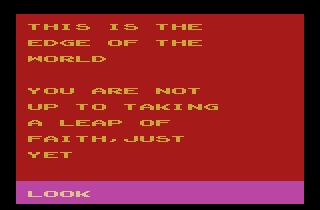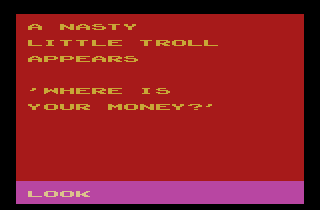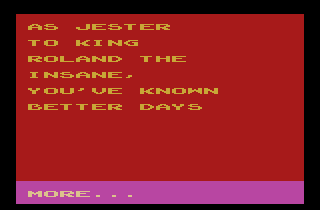Retro Replay Review
Gameplay
Dark Mage delivers a unique hybrid of classic text-adventure mechanics with modern controller-driven inputs. Instead of typing commands, you navigate a simple but effective menu system using your joystick: flick left or right to cycle through actions—“Take”, “Talk”, “Use”, “Move”—and press the button to confirm. This streamlined interface keeps the experience accessible for newcomers while invoking nostalgia for Infocom’s golden era of interactive fiction.
(HEY YOU!! We hope you enjoy! We try not to run ads. So basically, this is a very expensive hobby running this site. Please consider joining us for updates, forums, and more. Network w/ us to make some cash or friends while retro gaming, and you can win some free retro games for posting. Okay, carry on 👍)
Puzzles in Dark Mage are thoughtfully designed around dialogue choices, inventory management, and environmental exploration. You’ll barter information from tavern patrons, combine mysterious reagents found in the wilderness, and decide whether to bribe or outwit various characters. Each decision carries weight, often unlocking or blocking new paths in your quest to recover King Roland’s black rose.
The game’s pace strikes a careful balance between challenge and flow. Early sequences introduce simple fetch-quest tasks—retrieve a ledger here, deliver a secret note there—to ease players into the system. As you progress, the puzzles grow more intricate, sometimes requiring multiple visits to key locations or clever sequencing of actions. With a quick-access log that records your past dialogue choices, it’s never too hard to retrace your steps or rethink a strategy.
Another highlight is the responsive feedback loop. Whenever you attempt an invalid action—like trying to “Use” a mundane pebble on a locked chest—the game offers witty commentary rather than a curt “You can’t do that”. This sprinkles in humor and keeps the narrative voice lively, preventing the experience from ever feeling stale or frustrating.
Graphics
Visually, Dark Mage embraces a minimalist aesthetic that pays homage to early text adventures while incorporating tasteful pixel-art embellishments. Background scenes—such as the dank corridors of the royal dungeons or the bustling tavern square—are rendered in muted palettes that set a moody, medieval tone without overwhelming the text interface.
Character portraits pop up during key dialogue moments, offering subtle animations like a raised eyebrow or a shifting glare. Though not fully animated in the modern sense, these illustrations provide enough emotional nuance to give NPCs distinct personalities and make conversations feel more engaging than plain text alone.
Inventory items appear as small, detailed icons at the bottom of the screen once you’ve acquired them. They’re clear enough to distinguish at a glance—a thorny vine, a tarnished key, or the fabled black rose—while maintaining stylistic cohesion with the rest of the game’s design. This approach ensures that the visuals remain functional yet atmospheric.
The UI elements—menus, dialogue boxes, status bars—are unobtrusive and themed to match the dark, arcane subject matter. Buttons and highlights have a subtle glow effect, reinforcing the magical atmosphere without distracting you from the story or puzzles at hand.
Story
Dark Mage opens with a delightfully absurd premise: you’ve challenged the eponymous sorcerer to a card game while in an intoxicated state, only to lose King Roland the Insane’s prized black rose. The setup immediately hooks you with its blend of humor and high stakes—lose this next wager, and you’re banished forever, separated from your home and reputation.
From there, the narrative unfolds in episodic chapters, each centering on a different region of King Roland’s fractured kingdom. Along the way, you’ll encounter eccentric characters: a paranoid alchemist guarding forbidden experiments, a rogue dwarf seeking revenge on the crown, and even a mysterious forest spirit who may hold the key to locating the lost rose.
Dialogue is well-written, with plenty of situational humor and intriguing lore drops. The world-building is woven naturally into conversations, item descriptions, and environmental cues. You’ll gradually assemble a richer picture of King Roland’s troubled reign and the dark magic threatening to consume the realm if the black rose remains missing.
Choices matter in Dark Mage. Multiple endings hinge on whether you return the rose immediately, use it for your own benefit, or decide to confront the king directly about his notorious cruelty. These narrative branches add replay value and encourage you to explore alternative dialogue paths on subsequent playthroughs.
Overall Experience
Dark Mage strikes an impressive balance between retro inspiration and modern sensibilities. Its control scheme is instantly approachable, yet the depth of puzzles and branching storylines will satisfy veteran adventure fans. The game never feels padded—every dialogue choice and item interaction has a purpose in advancing the plot or developing the setting.
The atmospheric presentation and witty writing make for an engaging journey that rarely drags. Occasional backtracking is handled well with fast-travel options unlocked through key NPC alliances, ensuring that your quest to locate the black rose remains fluid rather than tedious.
While purists longing for text-only adventures might miss the command-line freedom, many will appreciate how Dark Mage integrates visual flair without sacrificing the mental challenges that define classic interactive fiction. Its varied outcomes and memorable characters make it a title you’ll want to revisit to catch every secret and alternative resolution.
In summary, Dark Mage offers a rewarding, charm-laden adventure that successfully modernizes the spirit of Infocom classics. Whether you’re a longtime fan of text adventures or new to the genre, this banishment-from-home tale provides plenty of magic, mystery, and merriment on your quest to reclaim the king’s black rose.
 Retro Replay Retro Replay gaming reviews, news, emulation, geek stuff and more!
Retro Replay Retro Replay gaming reviews, news, emulation, geek stuff and more!








Reviews
There are no reviews yet.